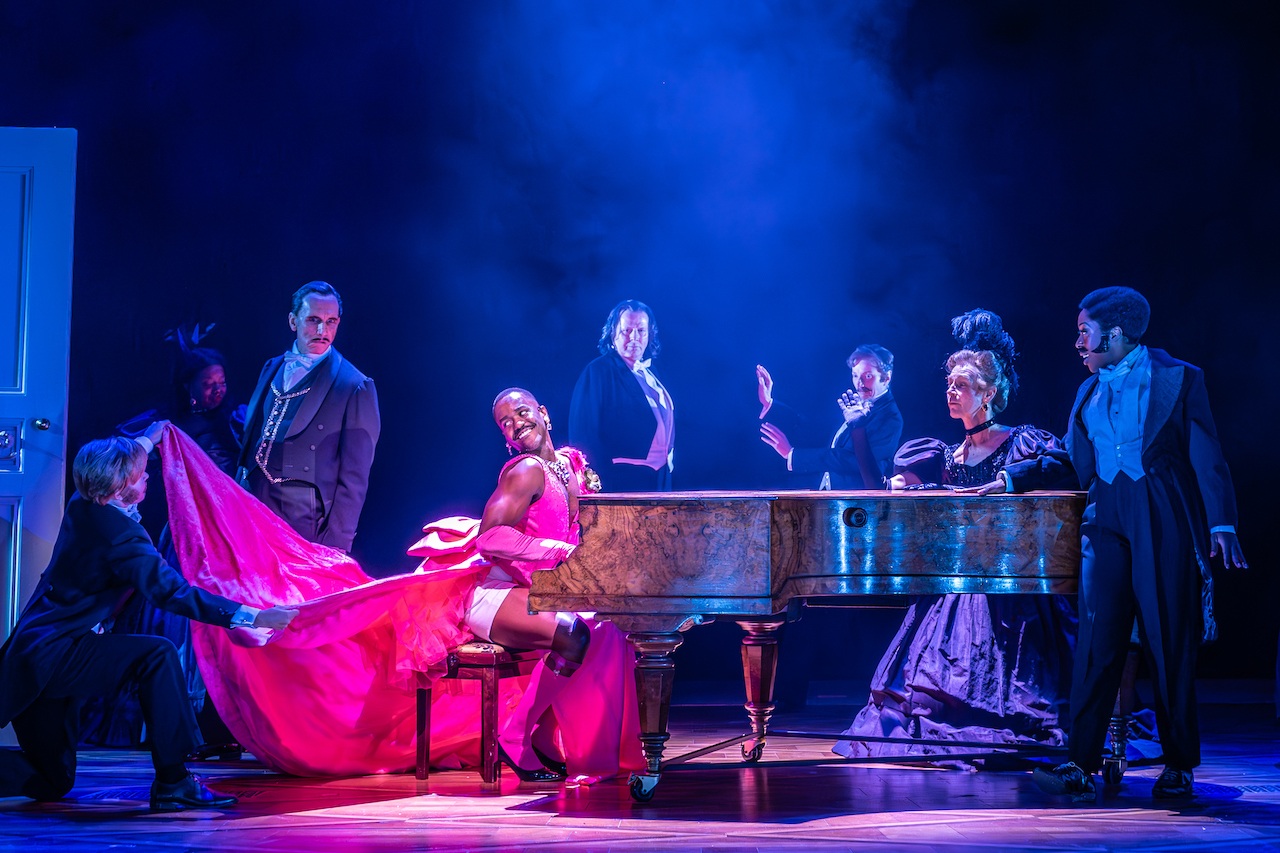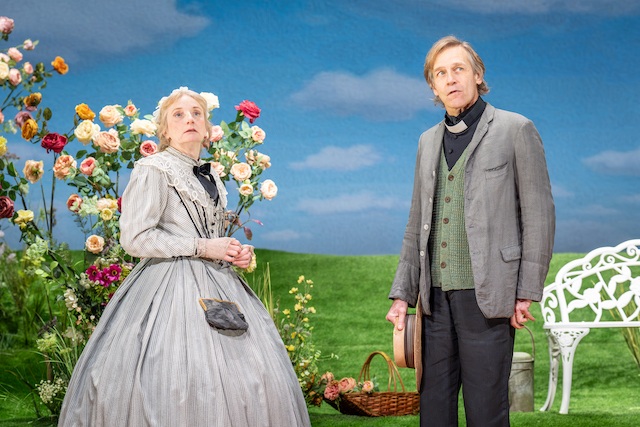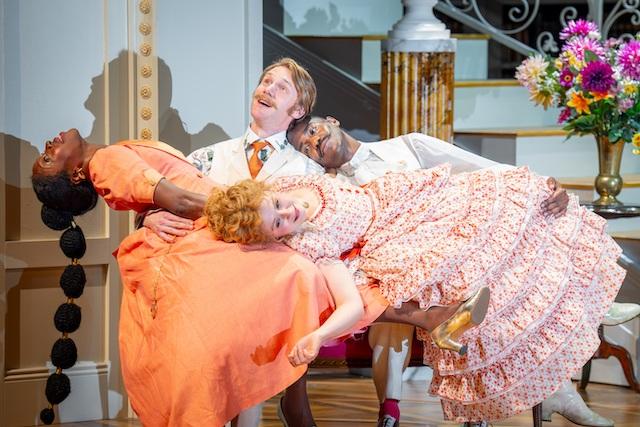If Harold Pinter’s work represents, as he slyly joked, the weasel under the cocktail cabinet, then Oscar Wilde’s represents the stiletto in the Victorian sponge – at a time when the stiletto was a slim dagger used for assassination. Beneath the fopperies and fripperies of his fin-de-siècle classic, every line draws blood as he skewers the false gods and hypocrisies of his age.
On paper there’s plenty to tempt audiences to the National Theatre’s latest production of Wilde's searing attack on social convention. Maybe you’re seduced by the thought of a cast that includes current Dr Who, Ncuti Gatwa, Wicked’s Sharon D Clarke, and W1A’s Hugh Skinner. Or by the fact that this outrageously flamboyant production is directed by Max Webster, the man also responsible for the introverted, crepuscular “headphones” Macbeth starring David Tennant and Cush Jumbo. Maybe you’re just a Wilde purist – if that’s not a contradiction in terms. Whatever your motivations, there’s no shortage of acid-tipped delight here to titillate and tantalise your sensibilities.
As the audience enters the theatre, a large Victorian handbag dangles against the red curtain – you can almost imagine it as an artwork in a gallery with the sign “Ce n’est pas un sac-à-main” beneath it. The first scene (pictured below) reveals Gatwa as Algernon in a swooping pink ball-dress, archly pretending to play Grieg’s piano concerto on a grand piano, before he leaps off the stool and – as the piano medley continues – leads the rest of the cast in a hallucinatory ballet.  It’s the first indication that the wit of Webster’s production is going to be every bit as visual as it is verbal. Whether it’s Gwendolen flirtatiously rolling her tongue at her future fiancé Jack, the butler Lane disdainfully rescuing a pair of knickers from behind a sofa cushion with coal tongs, or homoerotic statues of gods in the library, the jokes are everywhere you look. Indeed, there’s a brief period at the next scene’s start (traditionally the opening scene) in which it seems that the spectacle of the production is in danger of eclipsing Wilde’s dialogue, as Gatwa’s first few shards of wit fail to provoke laughter. Then Skinner (who plays Jack) enters, and with his inveterate skill for comic timing, gets the momentum going.
It’s the first indication that the wit of Webster’s production is going to be every bit as visual as it is verbal. Whether it’s Gwendolen flirtatiously rolling her tongue at her future fiancé Jack, the butler Lane disdainfully rescuing a pair of knickers from behind a sofa cushion with coal tongs, or homoerotic statues of gods in the library, the jokes are everywhere you look. Indeed, there’s a brief period at the next scene’s start (traditionally the opening scene) in which it seems that the spectacle of the production is in danger of eclipsing Wilde’s dialogue, as Gatwa’s first few shards of wit fail to provoke laughter. Then Skinner (who plays Jack) enters, and with his inveterate skill for comic timing, gets the momentum going.
Today it’s impossible not to realise what a lacerating attack The Importance of Being Earnest is on conventional marriage. Algernon’s aunt, Lady Bracknell, disapproves of long engagements because “They give people the opportunity of finding out each other’s character before marriage, which I think is never advisable”. Algernon himself declares witheringly to Jack, “You don’t seem to realise, that in married life three is company and two is none.”
At the same time it’s an ode to double lives and shadowy identities that was staged just three months before Wilde’s own hidden life would be revealed in court. The cast members gleefully mine every innuendo in the text, not least in Gatwa’s emphatic pronunciation of “Bunburying” – the practice of inventing an invalid friend (here called Bunbury) who provides an excuse for missing every tedious social engagement one might wish.
 As the evening progresses the production takes flight against Rae Smith’s elegant, haughtily aristocratic stage design, a cornucopia of chaise longues, chandeliers, and elaborate flower arrangements. The vividly-coloured turn-of-the-twentieth-century-style costumes add to the sense of the lavish, gently sybaritic lifestyles led by the characters. When Sharon D Clarke’s magnificent Lady Bracknell enters, she’s a vision in sunshine yellow, even as her character proceeds to cast clouds on the inappropriate aspirations of the young people around her. Clarke delivers her dialogue in a resonant, ringing Jamaican accent, bringing a whole new dimension to the humour through her grandeur, not least when she requests a cucumber sandwich by disdainfully pronouncing it “kukumber’.
As the evening progresses the production takes flight against Rae Smith’s elegant, haughtily aristocratic stage design, a cornucopia of chaise longues, chandeliers, and elaborate flower arrangements. The vividly-coloured turn-of-the-twentieth-century-style costumes add to the sense of the lavish, gently sybaritic lifestyles led by the characters. When Sharon D Clarke’s magnificent Lady Bracknell enters, she’s a vision in sunshine yellow, even as her character proceeds to cast clouds on the inappropriate aspirations of the young people around her. Clarke delivers her dialogue in a resonant, ringing Jamaican accent, bringing a whole new dimension to the humour through her grandeur, not least when she requests a cucumber sandwich by disdainfully pronouncing it “kukumber’.
By this point Gatwa is fully inhabiting his role as Algernon, bringing a full sense of anarchic outrage with his knowing glances and flamboyant flounces. Skinner, as ever is a marvel of nervous twitches and repressed emotions, with a physical style reminiscent of David Hyde Pierce in Frasier. Ronkẹ Adékoluẹjo as Gwendolen strikes a nice balance between being haughty and unashamedly randy and Eliza Scanlen has shades of Miranda Richardson’s Queen Elizabeth in Blackadder as she displays her preference for badly behaved men and women.
From the strong supporting cast, Richard Cant and Amanda Lawrence (pictured above) stand out as the equally nervy and neurotic Canon Chasuble and Miss Prism, not least for their failed kiss involving a frantic quivering of fern fronds. Julian Bleach makes his mark as two different butlers wryly observing the hypocrisies of the ruling class. There are very occasional longueurs, but they are more than made up for the moments when the production spreads its wings as freely and colourfully as a butterfly in the Amazon. Wilde purists might raise their eyebrows at the occasional additions to the dialogue – at one point Algernon claims he’s received a letter from Dalston Superstore – but this is a vibrant celebration of a playwright who has just as much to say to the 21st century as he did to his own.















Add comment